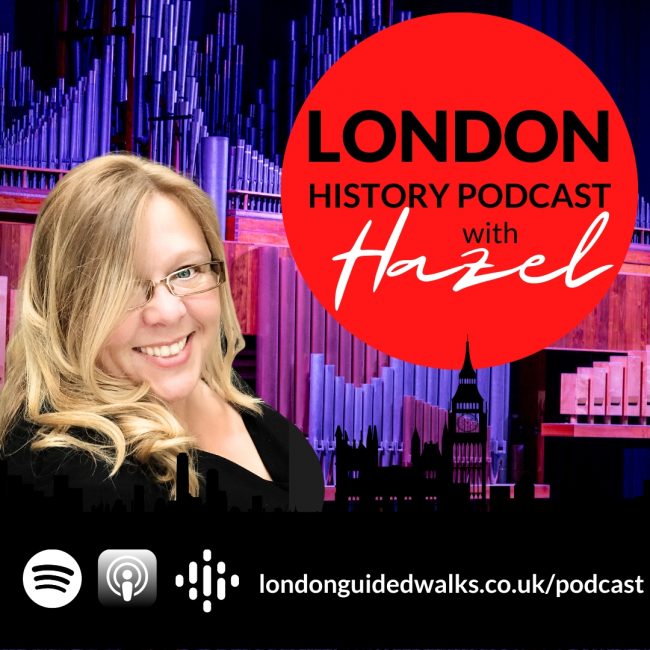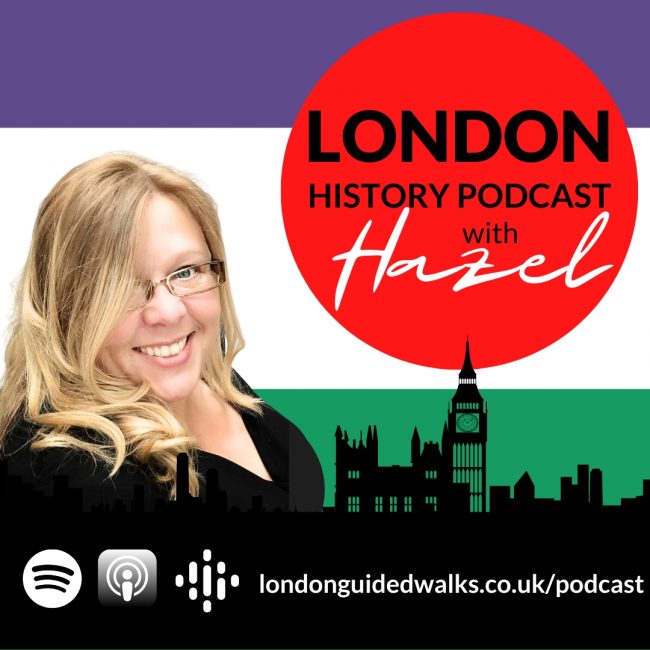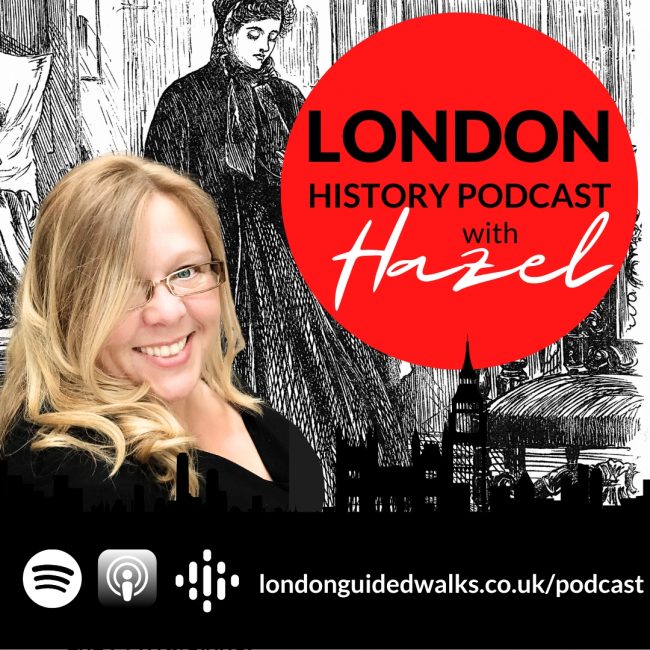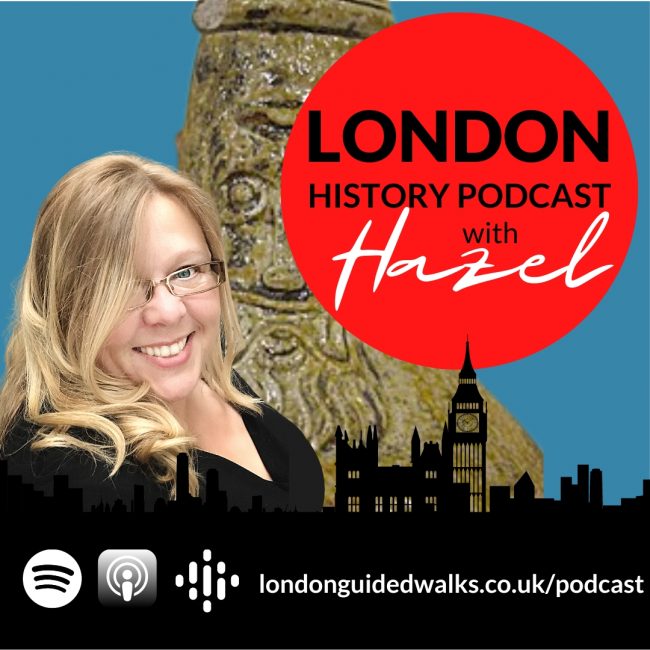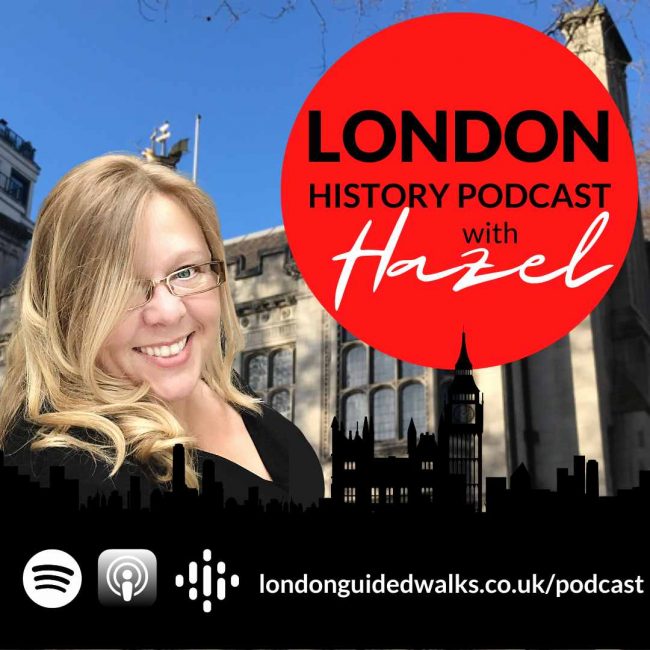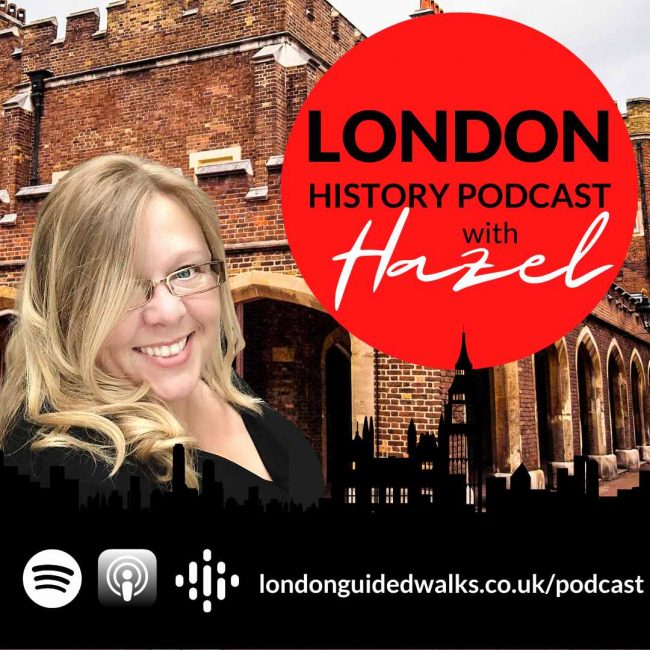Movies Filmed in London
Recommended Viewing:
Show Notes:
 Hazel Baker: Hello and welcome to London Guided Walks London History podcast. In the coming episodes, we will be sharing our love and passion for London, its people, places and history in an espresso shot with a splash of personality. For those of you who don’t know me, I am Hazel Baker, founder of London Guided Walks, providing guided walks and private tours to Londoners and visitors alike.
Hazel Baker: Hello and welcome to London Guided Walks London History podcast. In the coming episodes, we will be sharing our love and passion for London, its people, places and history in an espresso shot with a splash of personality. For those of you who don’t know me, I am Hazel Baker, founder of London Guided Walks, providing guided walks and private tours to Londoners and visitors alike.
To accompany this podcast we also have hundreds of London history related blog posts for you to enjoy at www.londonguidedwalks.co.uk/blog
It’s a week for celebrating as we have hit the amazing milestone of 3,000 listeners. Now I am beyond proud and thankful, not only for you, my lovely listeners, but also for our expert guests for sharing their love of London. Don’t forget if you want to be a guest, please do get in touch via our website, londonguidedwalks.co.uk/podcast.
Also for celebrating this week I was a guest on the Robert Elms show for BBC radio London, yes again. This time I was invited to talk about the nautical names of some streets of Islington and Hackney. I’ll leave a link to that in this week’s show notes.
Don’t forget. From 4th of July, we will be offering private tours, treasure hunts, and live London quizzes to private groups, all COVID-19 secure. And now, on with the show!
There’s no denying that London is a cinematic city with the meandering river Thames, instantly recognizable buildings. It’s St. Paul’s Cathedral, Buckingham Palace, Houses of Parliament and the sky scrapers of Canary Wharf. London is pretty hard to beat when it comes to the perfect city for film locations, film shot on the streets of London include Paddington. Bridget Jones, James Bond Skyfall, Mary Poppins Returns and Marvel’s Dr Strange with also much loved classics, such as Genevieve, Alfie, the lady Killers, Indiscreet. the Lavender Hill Mob.
Joining me today to talk all things London in film is film critic and feature writer Richard Luck.

Richard Luck
Feature writer, critic and author.
Twitter
Hazel Baker: Knowing your love of classic films Richard, I’m guessing we’re going to be sticking to the more timeless films rather than the modern day blockbusters?
Richard Luck: No, absolutely. I have a soft spot for things on Mary Poppins and the actual Disneyfication of London. What I have more of a problem with is, say a lot of American films, will just use the same basic locations; Buckingham Palace, the Palace of Westminster. The American films I like best, are by large, with regard to London, there’s An American Werewolf in London, the John Landis film, where shooting in Tottenham Court Road tube station. Walking around Tottenham Court tube station for years, brought back memories of that particular compelling scene, and shooting in Regent’s Park and the London Zoo and things like that.
Hazel Baker: And Southwark too by the Clink Prison Museum now, you know, that dodgy area, I was doing a tour in Southwark and I just mentioned how atmospheric this place is at night. It’s somewhere that I walk through quite a lot. When I first moved to London 20 odd years ago, it was not how it is now. And I said to my private tour group, “Oh yes, and American Werewolf in London was a filmed here” and one of the ladies piped up, she goes, “I know, I was one of the crew”. So, just one little tidbit of information that you’re giving and then suddenly they open up on some of the best highlights of their career. It’s just amazing.
Richard Luck: Who have you had on a tour?
Hazel Baker: Yeah. I’ve had the Joss Weldon of Marvel fame. That was a private behind the scenes tour of late Victorian, early Edwardian Covent garden.
Richard Luck: Fantastic.
Hazel Baker: Yeah. So who knows come out of that.
Richard Luck: Covent Garden, I saw the film. I always go back to for Covent Garden is Frenzy, the Hitchcock thriller. Because it’s the last time you see Covent Garden as a working market, rather than what it’s becomes today. And with Hitchcock being the son of Costermonger, of market people, it’s a really well, quite a loving portrayal and that’s the time capsule quality of film I love. I’m sort of late forties now when I first came up to London I used to go up to the Natural History museum. The Natural History museum was black, being sort of coated in soot and what have you. And now it shines, it’s beautiful. It’s one of the most beautiful buildings in the world.
To be reminded of London as it was, if you watched shady Ipcress File, the wonderful Harry Palmer thriller. And it’s also the secret service are based in Trafalgar Square. And the square is, you could drive all the way round. It looks very grey but it’s as it was. That’s how I first remember seeing it. Yes, it’s much nicer now, but it was what it was. And it’s nice to be reminded of that.
Hazel Baker: Yeah. I find film very, very useful because even though I might look at photos in archives watching the films, especially the older ones, when we’re talking and the 1950s, 1960s films, post-war, it’s not the glam as the Notting Hill films that you get.
And it’s all really, especially the industrial bit, we forget how busy and dirty London used to be. You know, we were simple manufacturers.
Richard Luck: I think that’s the incredible thing. When you say watch films. One of my favourite movies, it was a discussion on Twitter the other day, some great gangster films. And one of the ones that I count is The Long Good Friday which is largely filmed in the docks before the reinvention or the rejuvenation of the docks. And it’s amazing to see them one working and also the, sort of the element of dilapidation and it looked like an area, well, what was ever going to happen there? And now we know what has happened there, but I liked to be reminded.
And yes, the Thames was an artery. It wasn’t just tourist boats and what have you, it was a major thoroughfare through the city. And I that’s actually one of the films I’m very fond of Pool of London, which is a Basil Dearden film about a couple of shipmate who get off near HMS Belfast and proceed to sort of get into various scrapes in South London. And it’s lovely to see say Greenwich park. And it’s also one of the first films to have a interracial, it’s quite chaste, but it’s an interracial romance. And that’s the other thing I love about London in terms of tolerance and in terms of being a cosmopolitan city, that’s been the case for years. And I rather like in Pool of London it’s quite small scale. It doesn’t sort of pat itself on the back, but it’s sort of marking that progress and that, you know, those changes and I think that’s wonderful.
Hazel Baker: Yeah, no, absolutely. It’s funny you say about the Long Good Friday. Cause one of our tour guides Rob, he actually does a private Long Good Friday tour. He uses photos/stills from the movie and sort of takes you back to exactly what the conditions would have been and sharing, tidbits of the stories of the film and it adds another layer.
You don’t see that now, you walk around there now and you don’t see the same London anymore.
Richard Luck: Well, it’s funny. There’s one of the old Doctor Whos, I think, it’s Resurrection of the Daleks and it’s the now one of the plushest areas, it’s such a lovely little area, it’s sort of sandwiched between two old warehouses and what, at the time they filmed that it was on its last legs and now it’s the up and coming thrusting part of South London.
But it’s extraordinary to see somewhere outlive its first usage, which in that case was, you know, was industrial and now it’s houses and restaurants and flats. Yeah. It’s progress.
Hazel Baker: Well, one of the biggest progresses, I suppose we’ve seen from London movies is, I don’t know if you’ve seen it, is Passport to Pimlico.
Richard Luck: Yes. The newspaper I write for, The New European, was a paper that was very pro remain. Passport to Pimlico has a rather special place in our heart because it sort of talks about that sort of idea of independence. No, I absolutely love of the dealings with a distinctly London base. That’s certainly one of my favourites.
Hazel Baker: Well, I mean, I know a lot of it was done in the studio, but the location bits, I was umming and ahing asking myself “where is it?” Cause of course you can’t just go back now to the pile of rubble. That’s one of the questions I’ve been asked to talk about on the podcast is post-war London. And I think people forget that for decades, we were walking around in rubble.
In Passport to Pimlico they actually chose a bombsite in Lambeth to fim in. And when I was having a bit of a read about it, I found it quite amazing that when they took the set down for the film and they had to replace it as the bomb site had been found in order for the residents to get bombsite compensation.
Richard Luck: That’s what I love. I love things like that, but it is something to be reminded. I mean, I, I, as I said, I love the London of today. The sort of the post-Olympics, London. It’s so bright and brilliant, but yeah, to go back, I mean, that’s incredible to recover from what happened then. And I was going to mention Hope and Glory, a John Boorman film, which Boorman being a child of the blitz, it sort of becomes a romance or a romanticised period. And where that film is through the eyes of a child it’s also a reminder that there was nothing romantic at all. And it took some very tough people with a lot of resolve to get through it. And in fact, tough people being another thing with the East End, I had the Krays, the Peter Medak film. I like Legend of Tom Hardy movie. But with the Krays, they shot, because East London was changing, they shot predominantly in Greenwich and it really does still have those sorts of that ‘exactly as it was’. But it’s a pretty good approximation. Yes. The gangster films, crime films, they lend themselves very well to that sort of post war environment.
Hazel Baker: Yeah. I love the Lavender Hill Mob as well.
Richard Luck: I don’t think I could love anyone who didn’t ,even the end! Cause I mean, you sort of want them to get away with it. You speaking about Lavender Hill Mob, I mean the, also the Lady Killers… I lived in Camden for years and sort of saw the rejuvenation of King’s Cross, but to see it then, yeah. I rather like to be reminded of a London that doesn’t take itself too seriously.
And I suppose actually what the Paddington films have done really well as well. They’ve captured a London. yes. It’s the London of now, but just being in London is like being in a time machine. You can see the future sort of been thrown up around you. But there are a lot of surprises to be found under the soil and under the streets.
It’s great. And again, another wonderful ending, cause she does get away with it. Who could begrudge her? That is great.
Hazel Baker: I was looking at trying to piece a few of the pieces together and what we can see now from what was in the film. So I was walking on, you know, how. There’s the back end of King’s cross, where you’ve got all the redone area, Granary Square and that, but it also goes around where the Lighthouse is at the front of King’s Cross station
And then it goes across Euston Road. And they have to stop and make a phone call from a phone booth, of course, there are no mobile phones then. And where they stop in the film there’s a bnb. That’s where they’re standing and so I went there and you know what? It is still a bnb.
Richard Luck: Really. That’s fantastic. It’s fine. Well, I think does a very good job of London, in particular King’s Cross and Euston Road is Neil Jordan he’s actually a nice a Dubliner. He’s not terribly fond of London. However, he shot Mona Lisa, which was all around the King Cross as was The Crying Game as well. And he shot around those, those small I’m sure they’re not seedy hotels. I’m sure. Some of them were very nice, but he filmed a lot around there.
Yeah. Oh my God, that, that that’s a real blast from the past, to still be sort of in that line of work all those years on. Oh, wonderful.
Hazel Baker: Well, and also you might not know, but Dr. Crippen who was executed after being found guilty for the murder of his wife Cora Crippen, well, he had his romantic liaisons with his mistress in one of those not so seedy hotels in Kings Cross.
Richard Luck: Of course played by Donald Pleasence quite wonderfully on screen.
Hazel Baker: There’s more subtle villains. I would say, Michael Caine as Alfie. Yeah. Like he’s a villain in my book.
Richard Luck: He is! Sorry to just sort of turn this into lots and lots of name dropping, but I am interviewed Vin Diesel, I used to live in Australia and he was touring, it was XXX, which isn’t a terribly good film, but he was perfectly pleasant. His favourite film is Alfie and he said it because.
Hazel Baker: The original or the remake?
Richard Luck: The original. He even does a frankly terrible Michael Caine impression, but he just said, it’s, it’s a very interesting film about being a man and being a young man about town and the discovery of actually what I like about is at the end, he does realize he’s being callous and unpleasant, a Bounder and plenty of other things beyond and the price of that, as he says is “I don’t have my peace of mind”. And it was quite interesting hearing when we have the big Vin Diesel really was the peak of his powers. And so his favourite film was a film I would not have expected. I think Alfie is, Michael Caine is a wonderful actor and is brilliant actually in the Mona Lisa. He’s only in it a few times, but it’s quite nice. One of the scenes I believe his shot just around the corner from where he was raised in Rotherhithe.
There’s a blue plaque there. I used to see it on the bus. I lived in Catford for quite a while and as I came into London up to sort of Jamaica road and so on, I remember seeing the plaque. Quite right too! You can’t have London film being talked about without talking about Michael Caine1.
Hazel Baker: Oh, absolutely. I mean, he, he did a few London movies. Now I’m trying to think of the others he did.
Richard Luck: Even more recently things like Harry Brown and so on, what I like is he doesn’t sort of sentimentalize London. I’m sure he’d be wonderful in the Richard Curtis world, but his films do tend to be sort of that much looking at the sort of, the harder aspects of life in general and city life in particular.
There was another film of his on, as I said, actually, although he’s a hero in the Ipcress File, he’s a very sort of buttoned down a-typical hero. And I always get very annoyed because people talk about him being “oh he always plays himself well, if he does that, he’s a fascinating man, but I think he does an awful lot more than that.
Although it’s not a London film, I could sit down and watch The Man Who Would Be King every day, maybe twice on Sundays and be very happy.
Well, I was just thinking, Michael Caine is in Batman, Batman Begins with very opening scene is supposed to be in Gotham City and that’s actually filmed in Bloomsbury.
Yes. I was thinking of An Education, the Lone Scherfig film with Carey Mulligan.
I’m there. I mean, it’s a pleasant promo. I liked it, but what was wonderful, one of the last films to be shot at Waltham, so dogs and they also, they stop at, um, when I used to walk through sort of Bloomsbury, there was that little garage.
Hazel Baker: The art deco one?
Richard Luck: Yes. Yeah. And it’s great to see. I mean that, which again has gone now.
And it’s lovely that film actually sort of captures those places. Whenever I’ve seen that film, it’s perfectly chosen, but it’s great to be reminded. I had some know that’s a very good, funny evenings, so dogs and, uh, yeah, it’s nice to see it again. Nice to be reminded.
Hazel Baker: My very final question for you, Richard is maybe the hardest one of all, but what is your favourite London film?
Richard Luck: It’s actually a film that isn’t entirely or even predominantly set in London, but Withnail & I. I’m sure that’s quite a stereotype as an also you must get a lot, but it’s a Camden movie, even though the parts of it are shops are near the Trellick Tower because Camden had changed so much to see Richard E Grant re sighting Hamlet in front of the wolves.
The wolves are no longer there. They were giant anteaters in their place, which would make a very surreal image.
Hazel Baker: Oh, I thought you dealt with that very well, so well done because I would still not be able to choose.
Richard Luck: I didn’t realize that was an option.
Hazel Baker: Thank you so much for taking the time I’ve had a ball.
Richard Luck: Thanks Hazel!
Hazel Baker: If you’ve enjoyed this episode, then please do take a few moments and leave a review. It is very much appreciated. Thanks again, and see you next time!

 Hazel Baker: Hello and welcome to London Guided Walks
Hazel Baker: Hello and welcome to London Guided Walks 
